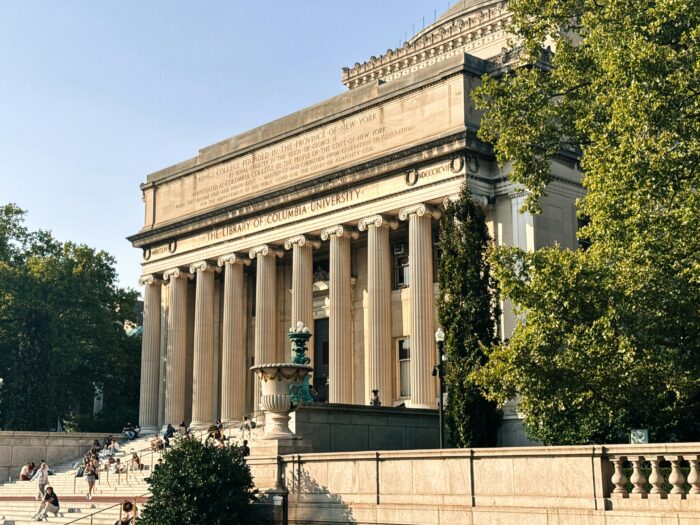I. Introduction
A. Overview of Columbia Law School’s Ranking
Columbia Law School stands as a beacon of academic excellence in the legal world, consistently securing its position among the top law schools nationally. Known for its competitive admissions landscape, Columbia boasts an acceptance rate of just 11.7%, underscoring the rigorous standards applied to selecting its student body. Beyond mere statistics, this prestige is backed by recognizably high standings in notable legal education rankings. Prospective applicants must therefore approach their applications with not only stellar credentials but also a profound understanding of what makes Columbia distinct.
B. Unique Features of Columbia Law School
Columbia Law School distinguishes itself with an array of unique attributes that appeal to aspiring lawyers worldwide. Situated in the heart of New York City, Columbia delivers unparalleled access to global law firms, financial institutions, and diverse public interest organizations, enhancing its students’ practical experiences and career prospects. The institution shines brightly in corporate, constitutional, and public interest law, harnessing a robust alumni network that continually facilitates students’ professional journeys. Columbia’s evolving focus on diversity and public service commitments is mirrored in its dynamic student initiatives and community-driven endeavors, aligning with broader legal and societal transformations.
C. Application Timeline
Prospective applicants aiming for Columbia Law School must adhere to a meticulous timeline to optimize their chances. The Early Decision deadline falls on November 15, providing an expedited path for candidates fully committed to Columbia. Meanwhile, those seeking a more traditional application route have until February 15 to submit their applications under the Regular Decision plan. To stand out in this selective environment, candidates should begin LSAT preparation at least six months prior to applying, ensure letters of recommendation are secured by September, and draft personal statements over the summer. Submitting applications well before the deadline can significantly enhance admission prospects, positioning applicants as desirable early birds in a competitive pool.
II. Columbia Law School’s Admission Requirements
A. Required Tests
Columbia Law School mandates the submission of standardized test scores as a critical component of its admissions process. Applicants have the flexibility to submit either LSAT or GRE scores, allowing them to showcase their academic prowess through different measures. Columbia places a high premium on these scores, with recently admitted students presenting a median LSAT score of 173, reinforcing the competitive nature of the applicant pool. Importantly, for those who have taken multiple standardized tests, Columbia encourages submitting all scores to provide a comprehensive perspective on academic capabilities.
B. Academic Prerequisites
Academic excellence forms the cornerstone of Columbia Law School’s selection criteria. Prospective students are expected to exhibit strong undergraduate academic performance, with the most recent class boasting a GPA range of 3.81 to 3.96. This academic rigor ensures that candidates not only exceed quantitative benchmarks but also demonstrate a steadfast commitment to their educational journey. Furthermore, applicants must be transparent about any academic or disciplinary infractions, as Columbia employs a holistic review process that values honesty and introspection in assessing candidates’ readiness to engage with challenging legal education.
C. Application Components
Crafting a compelling application for Columbia Law School requires meticulous attention to detail across several components. The personal statement serves as a pivotal element, providing insight into applicants’ character, motivations, and potential fit with Columbia’s culture. Additionally, Columbia offers the option of submitting essays that address diversity or personal resilience, inviting candidates to highlight aspects of their identity and experience that underpin their legal aspirations. The resume must comprehensively outline academic achievements, leadership roles, and extracurricular involvement, while letters of recommendation should emphatically support the applicant’s analytical and leadership strengths. Supplemental statements further offer chances to clarify specific interests or circumstances, ensuring a well-rounded portrayal of the applicant’s profile.
III. Comparing Acceptance Rates and Test Scores Across Top Law Schools
A. Law School Tiers
Columbia Law School firmly positions itself as a luminary within the “Highly Competitive Program” tier, where retaining elite status necessitates unwavering excellence. The school’s acceptance rate of just 11.7% reflects the selective nature of its admissions process, akin to its peers like Harvard and Yale. This tier categorization highlights a pronounced disparity in accessibility between schools, where Columbia’s rigorous demand for high academic achievement and personal distinction is evident. Candidates are thereby urged to align their applications not merely with Columbia’s numerical benchmarks, including a median LSAT score of 173, but also with its thematic priorities, such as public service and academic innovation.
B. Program Fit
In navigating the competitive landscape of law school admissions, understanding and articulating one’s “fit” within Columbia Law School becomes vital. Program fit transcends simple affinity; it encapsulates how well an applicant’s goals, values, and experiences resonate with the institution’s ethos and priorities. At Columbia, this alignment is predicated on the unique synergies offered by New York City’s vibrant legal scene and the school’s commitment to broadening students’ impact on global issues. Fit is demonstrated through a clearly articulated career vision, an understanding of Columbia’s academic and extracurricular offerings, and a palpable enthusiasm for contributing uniquely to the Columbia community. By prioritizing this alignment, applicants can craft compelling narratives that distinguish them from other high-caliber candidates and highlight their strategic fit within Columbia’s storied legacy.
IV. Columbia Law School’s Personal Statement and Essay Guidance
A. Role of Essays in Columbia’s Application Process
Essays play a crucial role in Columbia Law School’s application process, serving as a window into an applicant’s personal and professional aspirations, as well as their suitability for Columbia’s vibrant legal community. Personal statements not only explore an applicant’s motivations and unique contributions but also reveal how they fit within Columbia’s longstanding commitment to public interest and advocacy. These essays are evaluative tools that transcend grades and scores, capturing the intangible qualities that round out a candidate’s profile.
B. Tips for Crafting a Compelling Personal Statement
Crafting a compelling personal statement for Columbia Law School requires astute self-reflection and strategic storytelling. Applicants should utilize this platform to communicate their distinctive journeys, grounding narratives in concrete experiences that demonstrate character growth and intellectual curiosity. Tailoring the personal statement to Columbia’s specific academic offerings and values can spotlight genuine interest and commitment. Avoiding common pitfalls—such as vagueness or leaning into clichés—is paramount; instead, applicants should seek to inspire through clear, engaging stories that exemplify their readiness for Columbia’s demanding environment.
C. School-Specific Prompts
Columbia Law School offers prompts for optional essays, encouraging candidates to delve deeper into themes of diversity, resilience, and personal growth. Tackling these prompts requires an authentic reflection on past challenges and triumphs, emphasizing lessons learned and how these shaped current aspirations. Examples might include experiences that challenged preconceived notions or moments that inspired a dedication to service—each tailored to illustrate alignment with Columbia’s priorities. Writing with sincerity and specificity not only enriches these narratives but also conveys the applicant’s anticipated contributions to Columbia’s diverse and driven academic landscape.
V. Common Pitfalls and How to Avoid Them
When navigating the demanding admissions process at Columbia Law School, understanding common pitfalls can significantly enhance a candidate’s acceptance prospects. Here are some critical missteps to avoid and strategies to circumvent them effectively.
– Late Applications in Rolling Admissions: Submitting applications close to or on the deadline in a rolling admissions environment can significantly diminish the likelihood of acceptance. Although Columbia offers specific deadlines, applying earlier than these dates can better position candidates amidst intense competition. To mitigate risk, applicants should aim to have their complete applications submitted several weeks ahead of the official deadlines to benefit from an earlier review and decision-making consideration.
– Personal Statement Errors: Generic statements or those lacking focus can quickly disengage admissions committees. Avoid veering away from the central narrative or overloading the essay with too many themes. Instead, focus on a single, cohesive story or experience that uniquely encapsulates your journey and connects directly to Columbia’s core values. Each assertion should be backed by specific, real-life examples that highlight personal insight and growth.
– Informed Recommendation Letters: A frequent oversight is the solicitation of tepid or general recommendation letters. Strong, personalized letters from individuals who can provide specific anecdotes regarding your skills, growth, and achievements are vital. Candidates should maintain clear communication with recommenders, giving them ample time to formulate a well-rounded endorsement that aligns with Columbia’s standards, thereby enhancing the overall application narrative.
– Inconsistent Application Content: Consistency across application documents is crucial. Ensure that what you claim in your resume is reflected in your essays, and that your recommender’s perspectives harmonize with the personas portrayed in your statement. Columbia values authenticity, and discrepancies or contradictions can prompt concerns or confusion about the applicant’s self-awareness and transparency.
Avoiding these common missteps positions applicants uniquely to present a coherent and robust case for their admission to Columbia Law School, effectively leveraging each aspect of their application to build a compelling narrative.
VI. Columbia-Specific Tips
A. The Role of the Interview in Admissions
Columbia Law School employs interviews selectively, extending invitations to applicants who meet certain institutional criteria and demonstrate particular promise. These interviews serve as a mechanism to assess non-academic traits, providing insights into the candidate’s interpersonal skills, self-presentation, and alignment with Columbia’s values. To maximize this opportunity, candidates should prepare to articulate their motivations for pursuing law, discuss how they’ve handled challenges, and express why Columbia remains their preferred choice beyond academic metrics. Practicing situational and behavioral questions can build confidence and ensure readiness to convey an authentic, compelling narrative aligned with Columbia’s rigorous standards.
B. Understanding Columbia’s Culture and Values
Understanding and integrating Columbia’s culture and values into one’s application can significantly bolster its impact. Columbia prides itself on a distinctive balance between academic rigor and a commitment to societal impact, fostering an atmosphere where legal theory and practical application intersect. Applicants should clearly communicate how their experiences resonate with this cultural milieu, emphasizing their potential contributions to both classroom dynamics and broader school initiatives. Engaging directly with Columbia’s community, through campus visits or alumni conversations, can provide deeper insights into the school’s ethos, enhancing the authenticity and depth of one’s application. In demonstrating an alignment with Columbia’s strategic vision, applicants solidify their candidacy by showing they are not just participants, but enthusiastic contributors to the ongoing legal discourse shaping Columbia’s future.
Focusing on these tailored strategies when interacting with Columbia’s unique application components not only enhances the application but also solidifies the candidate’s positioning as a well-rounded, informed prospect who is genuinely excited to become part of Columbia’s renowned community.
VII. How to Strengthen Your Application
A. Recap
In pursuing a coveted spot at Columbia Law School, capitalizing on the school’s distinctive features is imperative. Columbia is renowned not only for its academic rigor but also for its strategic location in New York City, which offers unparalleled opportunities for internships, networking, and exposure to diverse legal landscapes. Applicants should strive to convey how they intend to leverage these resources to bolster societal impact and their intended career path. A holistic application approach, weaving together academic achievements, personal growth narratives, and a compelling fit with Columbia’s values, enhances the prospects of admission into this prestigious institution.
B. Actions You Can Take
To fortify your Columbia Law School application, begin with a comparative self-assessment against the class profile, focusing on metrics like the median LSAT score of 173 and a GPA range of 3.81 to 3.96. Utilize available resources such as Columbia admissions webinars and virtual go-to-law-school events, which can provide insights and refine your application strategy. Engaging in proactive admissions consultations is also recommended to obtain personalized feedback on your readiness and presentation. For those seeking expert guidance, consider availing a free consultation to discuss how to effectively refine your application narrative. For more insights and guidance, visit the MBA Exchange consultation service.
Ultimately, strengthening your application hinges on a strategic alignment of personal achievements with Columbia’s mission and contributions. By articulating a coherent, authentic narrative that captures your potential and resonating deeply with Columbia’s cultural ethos, you present yourself not just as an excellent candidate, but as an invaluable future member of Columbia Law School’s vibrant community.





